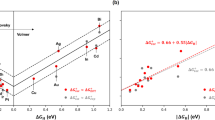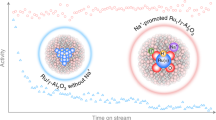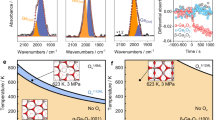Abstract
RECENT demonstrations1–3 that metal hydrides such as CuH+, AgH+ and AgH are formed as intermediates in the reduction of metal ions by molecular hydrogen in aqueous solution suggest that similar species may be involved in the oxidation and reduction of metal ions by hydrogen atoms, for example, in the well-known reactions :  and
and  These and related reactions between hydrogen atoms and metal ions have now been observed in aqueous solutions in which hydrogen atoms were generated in a variety of ways4–6 or introduced from the gas phase7,8; but their mechanisms are still uncertain and the subject of considerable controversy.
These and related reactions between hydrogen atoms and metal ions have now been observed in aqueous solutions in which hydrogen atoms were generated in a variety of ways4–6 or introduced from the gas phase7,8; but their mechanisms are still uncertain and the subject of considerable controversy.
This is a preview of subscription content, access via your institution
Access options
Subscribe to this journal
Receive 51 print issues and online access
$199.00 per year
only $3.90 per issue
Buy this article
- Purchase on Springer Link
- Instant access to full article PDF
Prices may be subject to local taxes which are calculated during checkout
Similar content being viewed by others
References
Halpern, J., Macgregor, E. R., and Peters, E., J. Phys. Chem., 60, 1455 (1956).
Webster, A. H., and Halpern, J., J. Phys. Chem., 61, 1239, 1245 (1957).
Halpern, J., J. Phys. Chem., 63, 398 (1959); “Adv. in Catalysis”, 11, 301 (1959).
Rigg, T., and Weiss, J., J. Chem. Phys., 20, 1194 (1952).
Weiss, J., Nature, 165, 728 (1950).
Rigg, T., Stein, G., and Weiss, J., Proc. Roy. Soc., A, 211, 375 (1952).
Czapski, G., and Stein, G., J. Phys. Chem., 63, 850 (1959).
Davis, T. W., Gordon, S., and Hart, E. J., J. Amer. Chem. Soc., 80, 4487 (1958).
Czapski, G., Jortner, J., and Stein, G. (to be published).
Rothschild, W. G., and Allen, A. O., Rad. Res., 8, 101 (1958).
Baxendale, J. H., and Hughes, G., Z. physik. Chem., N.F., 14, 323 (1958).
Czapski, G., Jortner, J., and Stein, G., J. Phys. Chem., 63, 1769 (1959).
Friedman, H. L., and Zeltman, A. H., J. Chem. Phys., 28, 878 (1958).
Uri, N., Chem. Rev., 50, 376 (1952).
Lefort, M., and Douzou, P., J. Chim. Phys., 53, 536 (1956).
Stein, G., Disc. Farad. Soc., 29 (in the press).
Schwarz, H. A., and Hritz, J. M., J. Amer. Chem. Soc., 80, 5636 (1958).
Halpern, J., “Adv. in Catalysis”, 9, 302 (1957).
Czapski, G., and Stein, G., J. Phys. Chem., 64, 219 (1960).
Author information
Authors and Affiliations
Rights and permissions
About this article
Cite this article
HALPERN, J., CZAPSKI, G., JORTNER, J. et al. Mechanism of the Oxidation and Reduction of Metal Ions by Hydrogen Atoms. Nature 186, 629–630 (1960). https://doi.org/10.1038/186629a0
Issue Date:
DOI: https://doi.org/10.1038/186629a0
This article is cited by
-
Enhancement of Phenol Degradation by Electron Acceptors in Anodic Contact Glow Discharge Electrolysis
Plasma Chemistry and Plasma Processing (2012)
-
Reactions of alkyl radicals with metal powders immersed in aqueous solutions
Glass Physics and Chemistry (2005)
-
Zur Frage der oxydierenden Wirkung von H-Atomen im sauren Ph-Bereich
Biophysik (1964)
-
Role of Ferrous Hydride in the Oxidation of Ferrous Ion by Hydrogen Atoms
Nature (1960)
Comments
By submitting a comment you agree to abide by our Terms and Community Guidelines. If you find something abusive or that does not comply with our terms or guidelines please flag it as inappropriate.



